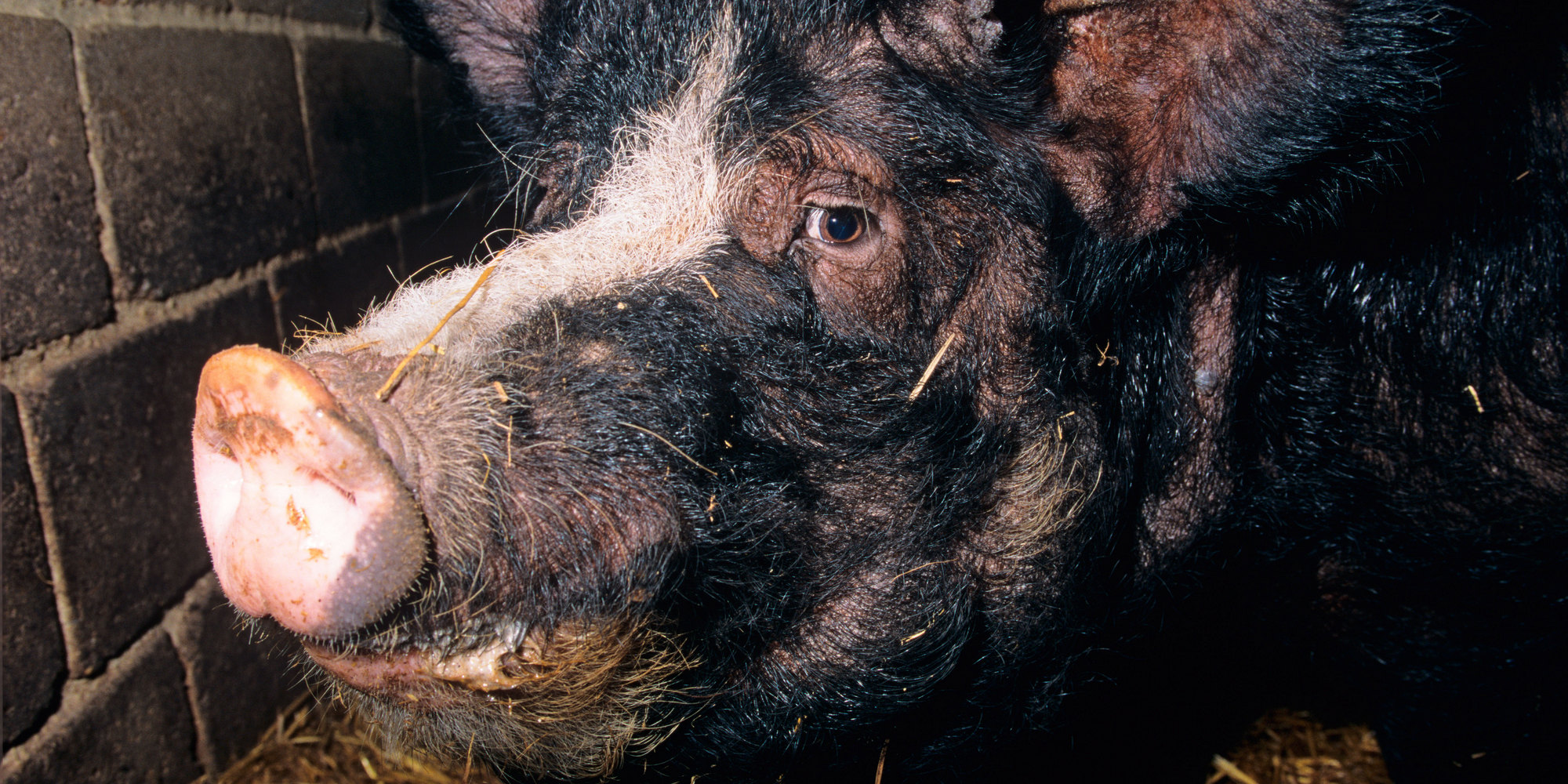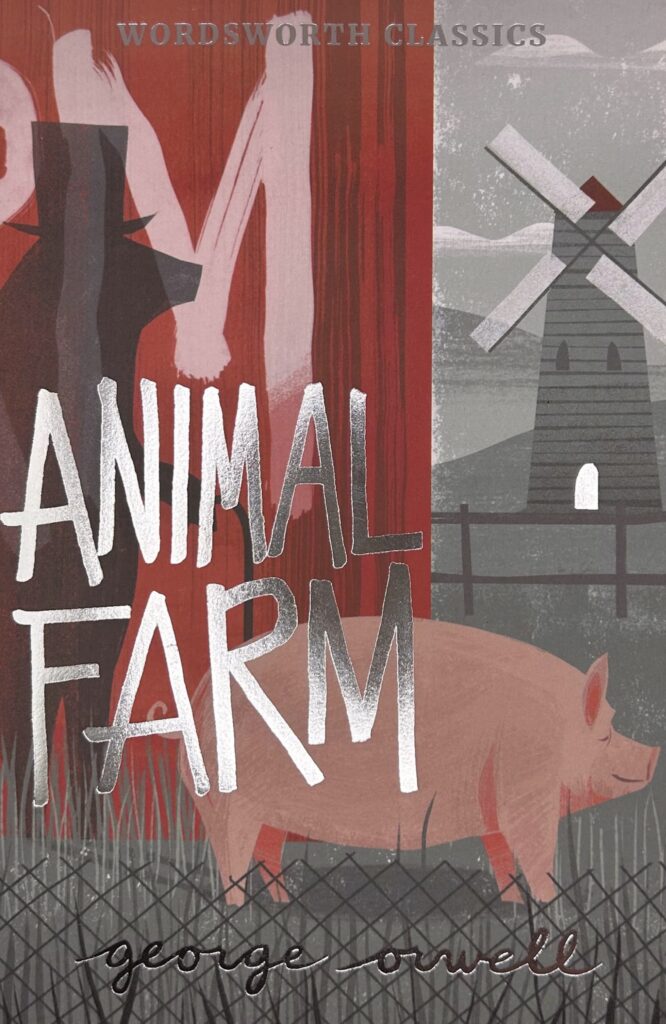
Andrew Palmer looks at Animal Farm
Andrew Palmer considers whether George Orwell’s allegorical tale of the Russian revolution, Animal Farm, may have had an unexpected influence.
Donald Trump is famously not much of a reader. As president, reportedly, he didn’t read daily intelligence briefs, policy papers or even memos. He probably wouldn’t have read a Post-it stuck to his golf clubs. His former ghost-writer, Tony Schwartz, told The New Yorker: ‘I seriously doubt that Trump has ever read a book straight through in his adult life.’[1] But here’s the thing. I have a feeling he’s read Animal Farm.
This hunch relies on the assumption that he has mistaken George Orwell’s satirical barnyard fable for a President’s Playbook.
Think about it. How much of this sounds familiar? Napoleon the piebald Berkshire boar seizes control of the farm. He understands the power of political theatre: under his rule, Orwell tells us, ‘There were more songs, more speeches, more processions’; he orders a weekly ‘Spontaneous Demonstration’; and introduces some very chantable slogans. ‘Four legs good, two legs bad!’ chant the sheep, drowning out anyone who dares to voice dissent. In short order, he develops a leadership cult; he awards himself medals and commissions self-aggrandising poems. He demonises his rival Snowball and has him chased off the farm. When the animals’ windmill is destroyed by a storm, he accuses Snowball of the act without any evidence. Snowball becomes a kind of bogey-pig, summoned up by Napoleon to account for every failure and consolidate his power. Oh, and he trains up a pack of vicious dogs which he uses to intimidate others into accepting his will.
Snap, snap and snap! The countless rallies, the cries of ‘Lock her up!’ and ‘Build the wall!’, the relentless self-praise; the conjuring of Antifa as a near-supernatural enemy – all have their counterparts in Orwell’s book. And on January 6 we saw what a well-orchestrated ‘spontaneous demonstration’ looks like. The full extent of Trump’s vicious pack of dogs became very apparent.
While we’re at it, Trump also mimics Napoleon in matters of his own appetites. Napoleon steals the farm’s supplies milk and apples for himself. He is also sexually incontinent. Orwell puts this tactfully: when the farm’s four sows produce thirty-one piglets between them, he notes dryly: ‘The young pigs were piebald, and as Napoleon was the only boar on the farm, it was possible to guess at their parentage.’ Less decorously, Trump famously told Billy Bush that he likes to ‘grab ’em by the pussy’.
Trump’s diligent study of Animal Farm has also taught him that the past is mutable. Napoleon’s propagandist Squealer rewrites history to suit the regime. After the Battle of the Cowshed, in which the animals repel a renewed attack from farmer Jones, Snowball is awarded the military decoration ‘Animal Hero, First Class’ for his heroism and strategic genius. But, once Snowball has been exiled, Squealer alters the past in three stages. He begins by suggesting that ‘the time will come when we shall find that Snowball’s part in it was much exaggerated’. Soon after that, he asserts that Snowball was in fact in league with the enemy and, when the trusting cart-horse Boxer remembers Snowball’s medal for bravery, Squealer replies: ‘That was our mistake, comrade. For we know now – it is all written down in the secret documents that we have found – that in reality, he was trying to lure us to our doom.’ Later still, when the animals’ memories have dimmed, he rewrites the rewrite, asserting that Snowball was never awarded a medal at all: ‘This was merely a legend which had been spread sometime after the Battle of the Cowshed by Snowball himself. So far from being decorated, he had been censured for showing cowardice in the battle.’ With Squealer as his enabler, then, Napoleon overturns the laudable guiding principles of the farmyard republic with a gamut of lies, half-truths and faulty reasoning.
Squealer’s tall tales are what we now know as ‘alternative facts’. This phrase was first used by Trump’s senior presidential advisor Kellyanne Conway to defend press secretary Sean Spicer’s false claims about the size of the crowd at Trump’s inauguration (he had called it the ‘largest audience to ever to witness an inauguration, period’). Conway went on to deploy some alternative facts of her own when she invented an imagined terrorist attack on US soil, the so-called ‘Bowling Green Massacre’, to defend Trump’s 2017 Muslim-focused travel ban. But Trump’s most clear and present Squealer has surely been his fourth and final press secretary, Kayleigh McEnany, whose tenure at the White House began with this whopper: ‘I will never lie to you. You have my word on that.’ As Forbes journalist Russell Lane put it last week, McEnany is ‘a propaganda prodigy at 32 who makes smiling falsehood an art form’.[2]
But I know what you’re thinking. This isn’t entirely fair! Napoleon is, of course, Orwell’s satirical portrait of Joseph Stalin, the brutal dictator who held sway over the Soviet Union. Trump may be a grifter, a bully, a liar-in-chief, sure, but he’s no Joe Stalin. OK, yes, he is responsible for separating Mexican children from their parents and placing them in internment camps, he has been complicit in the ethnic cleansing of Syrian Kurds by Turkey, he has defended white supremacists, obstructed justice, sought dirt on his opponents, attacked the press, encouraged political violence, tried to overturn a fair election, and surrounded himself with a crowd of trembling sycophants – but he hasn’t overseen the ruthless extermination of his opponents; he hasn’t created a brutal surveillance state; he hasn’t sought a total suppression of free speech. Be fair.[3]
But this misses the point. The true target of Orwell’s satire wasn’t Joseph Stalin, but rather the people who were taken in by him. The boorish boar can’t help but be himself; the other animals are culpable in their slow-wittedness and gullibility. Orwell told the critic Dwight Macdonald that the key turning point in the story is when the ruling pigs keep the farm’s apples and milk for themselves: ‘If the other animals had had the sense to put their foot down then, it would have been all right’, he wrote.[4] But the animals do not put their foot down. The moment passes, Napoleon consolidates his power, and then it’s too late.
While Orwell may invite us to sympathise with the animals as we watch their revolution being corrupted, he also shows them to be culpably credulous. When Squealer rewrites the history of the Battle of the Cowshed, ‘some of the animals heard this with a certain bewilderment, but Squealer was soon able to convince them that their memories had been at fault.’ When he delivers a raft of fake statistics about the supposed success of Napoleon’s policies, ‘The animals believed every word of it’, despite the evidence before their eyes and their empty bellies. After the show trials in which several animals make forced confessions and are savagely executed, Boxer ruminates: ‘It must be due to some fault in ourselves.’
Orwell was aiming his sights less at Russian citizens, but rather the Soviet apologists on the British Left. This group included prominent journalists, lawyers, professors and clergymen; throughout the 1930s and 40s, they were busy writing articles, reports, pamphlets and books – doubtless they would have Tweeted too if only it were possible – enthusiastically defending Stalin’s regime, insisting that it showed the West a hopeful alternative to the inequalities and failures of industrial capitalism. Curiously enough, the willingness of such figures to hold faith in Stalin, defend his actions and decry all negative stories as the slurs of his enemies is remarkably similar to the unshakeable faith of the crowds who attacked the United States Capitol on January 6 in their Make America Great Again caps. The bigger the falsehood, the stronger their faith; the more outlandish the conspiracy theory, the more steadfast their belief. In MAGA minds, the storming of the Capitol was surely something akin to the animals’ triumphant rebellion.
As he turned the pages, thoughtfully ruminating on the implications of what he read, Trump must surely have noted just how easy it is to stir the emotions of those who feel overlooked and unheard. Perhaps this was the most important lesson he took away. However, if Animal Farm has indeed been Trump’s playbook, there is one thing for which we can be grateful: his presidency has a different ending. Perhaps, now that he has more time on his hands, he’ll read Nineteen Eighty-four – nodding with approval over the sum 2+2=5.
For the rest of us, Animal Farm still carries its power as a satire. Yes, it was inspired by very particular circumstances – Orwell aimed to convince fellow leftists to abandon their lingering attachment to the Soviet regime – but it remains more broadly applicable as a satire on any arrogant, self-aggrandising, hate-fuelled demagogue, and a warning to us all about the dangers of allowing great sections of our community to feel disenfranchised and hard-done-by.
[1] https://www.newyorker.com/magazine/2016/07/25/donald-trumps-ghostwriter-tells-all. Also, see Michael Wolff’s comment: ‘Trump didn’t read. He didn’t really even skim. If it was print, it might as well not exist.’ https://nymag.com/intelligencer/2018/01/michael-wolff-fire-and-fury-book-donald-trump.html
[2] https://www.forbes.com/sites/randalllane/2021/01/07/a-truth-reckoning-why-were-holding-those-who-lied-for-trump-accountable/
[3] For a more complete account of Trump’s crimes and misdemeanours, see the 358-page list at McSweeneys: https://www.mcsweeneys.net/articles/the-complete-listing-so-far-atrocities-1-1-053
[4] Letter to Dwight Macdonald, 5 Dec 1946. George Orwell: A Life in Letters (Penguin, 2011) p.334.
Image: Napoleon was “a large, rather fierce-looking Berkshire boar”. Credit: Ernie Janes / Alamy Stock Photo
Books associated with this article
